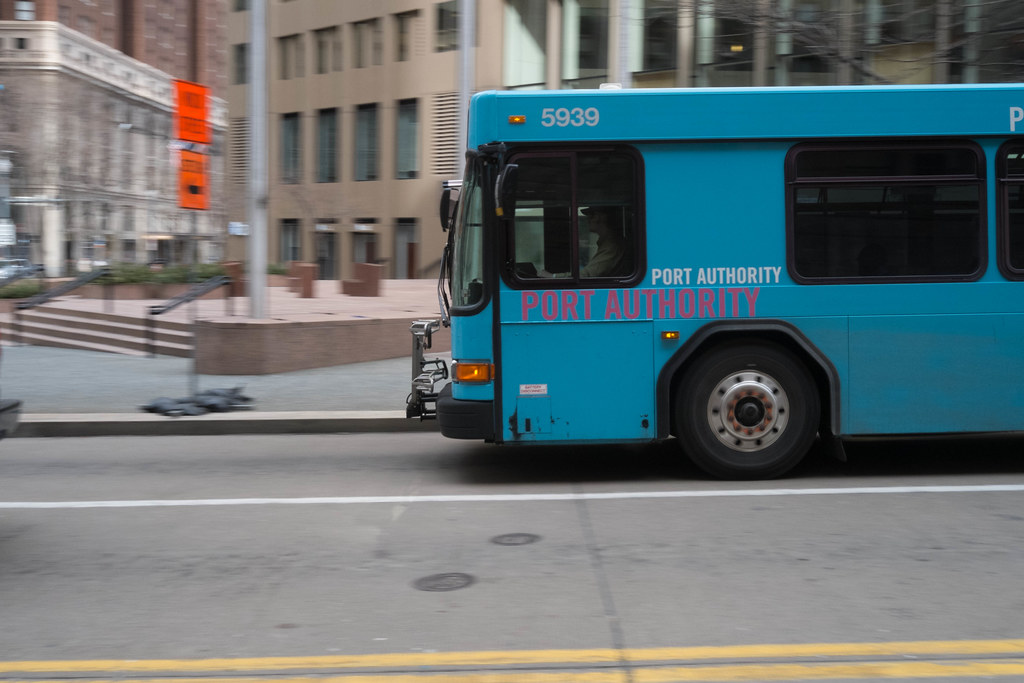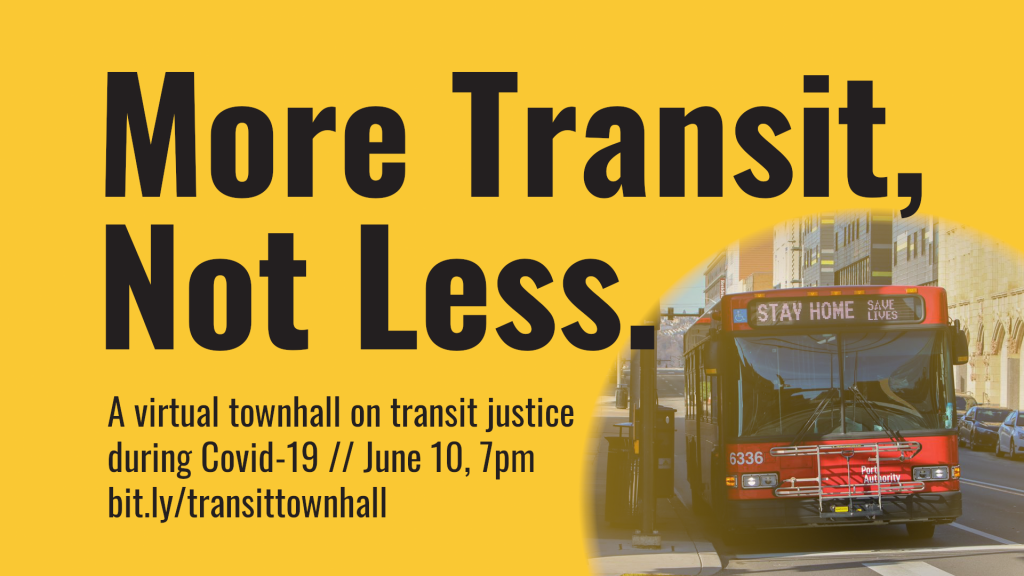
Dozens of PPT members address the board on 3 priority areas of concern
On May 29, 31 speakers organized by PPT addressed the Port Authority board (testimony begins at 22:10) to raise concerns and provide actionable solutions on fares, transit funding, the use of data/public engagement in decision-making. The powerful testimony showed why the Port Authority Board of Directors needs to take more of a leadership role at the Agency. We called on the board to ensure that riders can afford to public transit during this economic depression, to prevent devastating funding cuts from Harrisburg, and to allow rider voices and data to drive decision-making during this volatile time.
On the need for instituting a low-income fare program, and to allow riders to use EBT cards to board:
“I am an essential worker, I have been working through the whole pandemic…I have to choose between 3 bills at the beginning of the month to pay and I have no money. This $97.50 a month [of transit fares], I can’t afford it.”
– Deanna Turner, PPT member from Hazelwood
Port Authority is proposing to reinstate full fare collection on June 8th. The riders taking transit now are disproportionately low-income, and all are devoid of other transportation choices. Many or most of these riders cannot pay full fares. To put it in context: a third of Americans didn’t pay rent in May. Tens of thousands of people—and those are the people with cars!—are lining up for free food at food banks. We’re living in a global pandemic, and an economic depression. Mass transit, more than ever, needs to be considered as a necessity, like housing, electric, water, and food. We need emergency interventions and fare relief just as all of those other services have taken dramatic steps to address the economic fallout of this crisis.
If Port Authority cannot afford to wait to reinstate fares, then Port Authority can also not afford to wait to implement a low-income fares program. Riders can’t wait for months for PAAC’s fare consultant to establish that they are too poor to pay to ride. Just as we cannot retroactively eat to make up for months of hunger, or remedy the effects of an eviction after months of being homeless, the impact of making transit inaccessible to low-income or no income Allegheny County residents will be irreversible.
Port Authority board is proposing a return to full fares to get money off the backs of the lowest income Allegheny County residents at the same time that the board is silent or actively moving to defund transit at a state level, and is silent about the proposed second federal transit stimulus, which leaves the Port Authority out even as smaller agencies would get a share.
On Transit Funding Concerns and the Board’s Responsibility
“I’m here today to urge the Port Authority board to be an active advocate at the state level, and to hold its members accountable for upholding their duties to the agency. We need a dedicated, expanded source of funding for transit from the state, not just for the Port Authority, but also for transit agencies for urban, suburban, and rural areas across the state.”
Toni Haraldsen, PPT member from Aspinwall
“I’m here today to ask all the Port Authority board, all of whom are political appointees, to lean heavily on the Congressional delegation, to influence the upcoming Heroes Act legislation…to not only pass the bill, but to negotiate for increased transit funding to come directly to our agency. As we slowly lift restrictions, we must be keenly aware that the economic and public health emergencies continue… Instead of piling on to struggling workers, our system should use Heroes Act emergency funding from the federal government to continue to provide much-needed service without further burdening riders.”
–Jay Ting Walker, Secretary of the Allegheny County Transit Council
The Port Authority board member and State Representative Lori Mizgurski has proposed a bill in PA’s House of Representatives that would discharge the PA Turnpike’s transit funding responsibility without a dedicated alternate funding source in place. This reckless legislation would impact residents in every county across the State. Defunding transit would bring our state economy to a grinding halt and diminish access to critical needs like food and healthcare at a moment when both are precarious. On May 14th, more than 80 organizations, labor unions, and elected officials across PA signed on to a PPT/Philly TRU joint letter to call for the Turnpike to uphold its transit funding responsibility until a progressive and sustainable replacement funding source can be established.
The Port Authority board must advocate to ensure that state transit funding remains stable. Moreover, it is critical that the upcoming federal Heroes Act legislation includes sufficient emergency transit funding to address the national transit funding crisis. The current Heroes Act legislation also leaves Port Authority out even as smaller transit agencies would get a dedicated share. Port Authority board members must speak up to ensure that the federal Heroes Act transit stimulus gives all regions their fair share.
On Public Engagement, Equity and Data-Driven Decision-Making
“With data, you get a real-time or recent look into metrics like, for instance: ridership per route over time, ridership by time of day, the types of complaints (ADA issues, buses passing riders by) that Port Authority is receiving over time, or the percentage of transit workers out on sick leave, etc. However, data is nothing without an equity lens, and without capturing it by race…And Black and Brown people must be given ownership over the data…When you say that the community runs the Port Authority, it is time we start to see that in action.”
-Fawn Walker-Montgomery, Executive Director of Take Action Mon Valley
“Signing up [to speak at the board] required me to click on two unique links, which are not readily available on the homepage…Scrolling through the past year of posts, I found that neither the Port Authority’s Twitter nor Facebook…have linked to the meeting sign-up page. In fact, as far as I could find, neither of these made reference to the existence of public board meetings.”
-Sinjon Bartel, PPT member
The bar is too high to access Port Authority board meetings, and the allowable forms of participation are too limited. The only way to give public input is by pre-registering to testify a week in advance on two separate website links for a 9:30 am Friday meeting, once a month. The lack of Port Authority board meeting accessibility has always been a concern, but it is particularly egregious at a time when decisions on funding, transit service allocation and fares are happening quickly and behind closed doors. The threats to transit are existential. Riders must have the opportunity to share their experience of using transit and the ability to guide decision-making to address the transit barriers that they are experiencing. Moreover, these board meetings and board committee meetings must be spaces for meaningful discussion among the board, staff, and the public, and not merely be a pro-forma stamp on decisions already made.
The Port Authority has created a valuable new data dashboard (starting at 1:10:01) that provides insights into ridership levels, complaints and out-of-service impacts by route and bus garage. However, it’s apparent that the decisions around allocating transit service frequency are not happening in a dynamic or nuanced way, which is what riders need to ensure that transit is effective and safe. At a time when overcrowding is a public health hazard, this data dashboard must be used to evaluate and reallocate transit service to address the communities where the ridership is still high. Port Authority should make it clear how this data is being translated into policy decisions to address issues around equity and accessibility. Moreover, this data platform should be made public to allow members of the community and the Port Authority board to offer insights into our transit system at a systemic level, and to hold our agency accountable to making progress on any barriers to access.
Join PPT’s Transit Justice Townhall – More Transit, Not Less – on June 10th to build the agenda for transit advocacy in these times.
